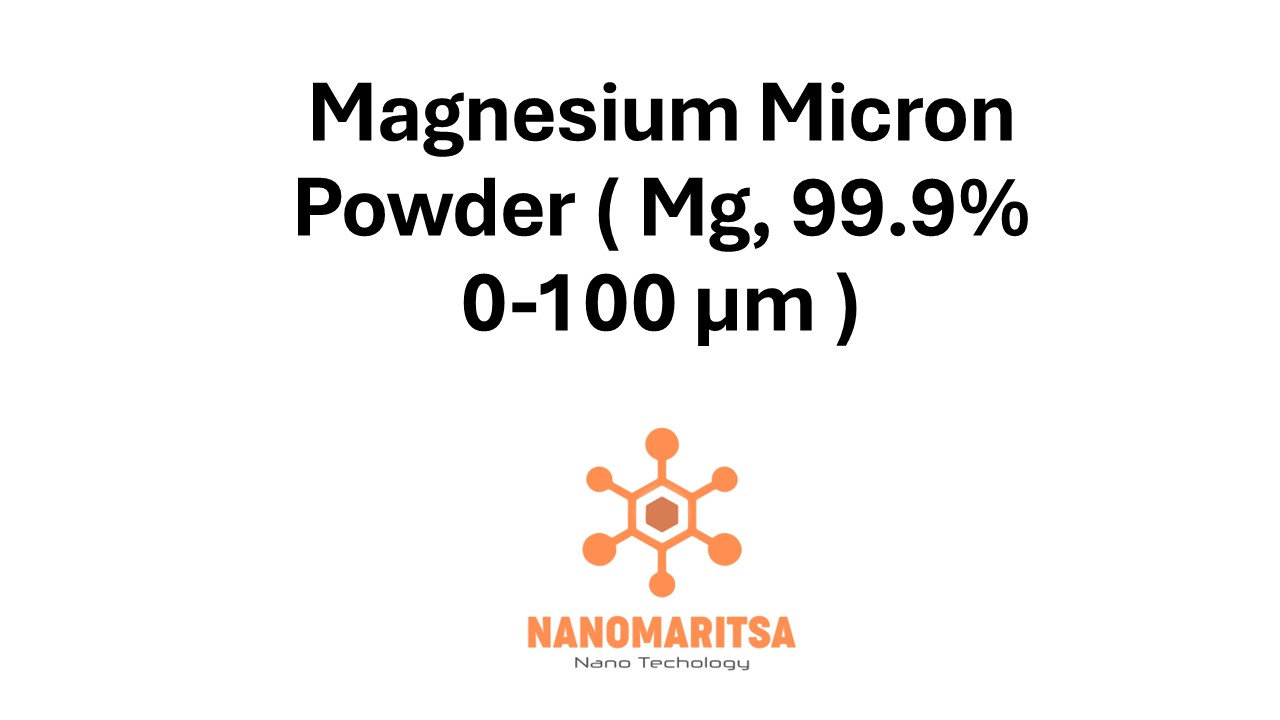Magnesium Micron Powder (Mg, 99.9%, 0-100 µm) is a high-purity magnesium powder with a particle size distribution ranging from 0 to 100 micrometers. This versatile material, with a purity of 99.9%, offers excellent properties for a wide range of applications requiring lightweight, corrosion-resistant, and thermally conductive materials. Its fine particle size and high purity make it ideal for use in industries such as energy storage, aerospace, automotive, and materials science.
1. Key Properties
- High Purity (99.9%): Ensures minimal impurities, offering superior material consistency and performance in demanding applications.
- Particle Size (0-100 µm): Provides a broad range of particle sizes, allowing for customization in applications such as powder metallurgy, coatings, and composites.
- Lightweight: Magnesium is one of the lightest structural metals, making it ideal for applications requiring reduced weight without compromising strength.
- Corrosion Resistance: Magnesium exhibits natural resistance to corrosion, especially in non-alkaline environments, making it suitable for use in harsh conditions.
- Thermal and Electrical Conductivity: Magnesium provides good thermal and electrical conductivity, which is beneficial for heat management and electronic applications.
- Flammability: Magnesium powder is highly flammable in fine forms and should be handled with caution, especially in powder metallurgy or manufacturing processes involving heat.
2. Applications
- Energy Storage: Magnesium powder is used in the development of magnesium-ion batteries, which are being researched as a lightweight, cost-effective alternative to lithium-ion batteries.
- Aerospace and Automotive: Magnesium is widely used in lightweight alloys for aerospace and automotive components, improving fuel efficiency and overall performance due to its low density and high strength-to-weight ratio.
- Powder Metallurgy: Magnesium powder is used in powder metallurgy processes to create high-performance magnesium alloys, which are used in parts that require both strength and light weight, such as gears, housings, and engine components.
- Coatings and Paints: Magnesium powder is used in the production of metallic coatings and paints, providing anti-corrosive properties, especially in marine and industrial environments.
- Thermal Management: Magnesium’s good thermal conductivity makes it valuable for heat dissipation applications, including heat sinks and components in electronic devices.
- Fireworks and Flares: Magnesium is used in the production of pyrotechnics, fireworks, and flares due to its ability to produce a bright, white light when burned.
- Biomedical Applications: Magnesium alloys, including those made from magnesium powder, are used in implants for medical applications due to their biocompatibility and the fact that they can naturally degrade in the body.
3. Advantages
- Lightweight: Magnesium’s low density makes it an ideal material for lightweight structural applications, helping reduce overall weight in industries like aerospace, automotive, and electronics.
- Good Corrosion Resistance: With proper alloying, magnesium exhibits good corrosion resistance, making it suitable for outdoor and marine applications where durability is critical.
- Enhanced Thermal Conductivity: Magnesium’s ability to conduct heat effectively ensures efficient heat management in various applications, from electronic devices to automotive engines.
- Versatility in Manufacturing: The fine particle size and high purity of magnesium powder enable its use in a variety of manufacturing processes, such as additive manufacturing, powder metallurgy, and coatings.
- Sustainable Use: Magnesium is abundant and can be recycled, contributing to more sustainable manufacturing processes and reducing the environmental impact of production.
4. Recent Trends and Research
- Magnesium-Based Batteries: Research is focusing on developing magnesium-ion batteries as a potential alternative to lithium-ion batteries, aiming for lower cost, higher capacity, and better energy efficiency.
- Lightweight Alloys for Automotive and Aerospace: With the growing demand for lightweight materials in transportation and aerospace industries, magnesium alloys are being increasingly used to reduce fuel consumption and improve performance.
- Biodegradable Implants: Magnesium alloys are being explored for use in biodegradable medical implants, where the material naturally dissolves in the body over time, eliminating the need for removal.
- Magnesium Recycling Innovations: Ongoing research into more efficient recycling processes for magnesium and its alloys is helping reduce waste and improve the sustainability of magnesium production.
- Thermal Management in Electronics: Magnesium’s thermal properties are being leveraged in next-generation electronic devices and systems to improve heat dissipation and prevent overheating.
5. Future Prospects
Magnesium Micron Powder (Mg, 99.9%, 0-100 µm) is expected to continue playing a crucial role in emerging technologies and high-performance applications. Future developments may include:
- Next-Generation Batteries: Magnesium-ion batteries are anticipated to become more prominent, offering a more affordable and sustainable solution for energy storage, with potential applications in electric vehicles, renewable energy storage, and consumer electronics.
- Lightweight Structural Materials: As industries like automotive and aerospace continue to prioritize lightweight materials for efficiency and performance, magnesium-based alloys will play an increasingly important role in manufacturing high-performance components.
- Advanced Thermal Management: The need for improved thermal management in electronics and power systems will drive the demand for magnesium-based materials in heat sinks, electronic housings, and other thermal management solutions.
- Biodegradable Medical Devices: The use of magnesium in biodegradable medical implants and surgical tools will continue to grow, providing a sustainable and patient-friendly alternative to traditional materials.
- Sustainable Manufacturing Practices: The growing focus on reducing environmental impact in manufacturing will lead to innovations in the recycling and sustainable production of magnesium, ensuring its continued use in green technologies.
With its unique combination of lightweight, corrosion resistance, and thermal properties, Magnesium Micron Powder (Mg, 99.9%, 0-100 µm) continues to be a critical material for industries that require advanced, high-performance solutions. As research into its applications and sustainability continues, magnesium powder is expected to play an increasingly prominent role in energy storage, automotive, aerospace, and many other sectors.
| Measurement (kg) | 1 kg, 5 kg, 25 kg, 50 kg |
|---|






